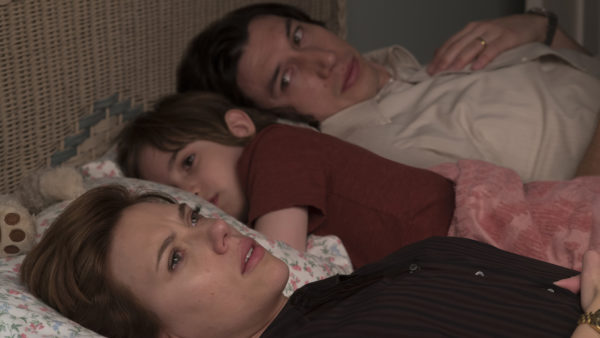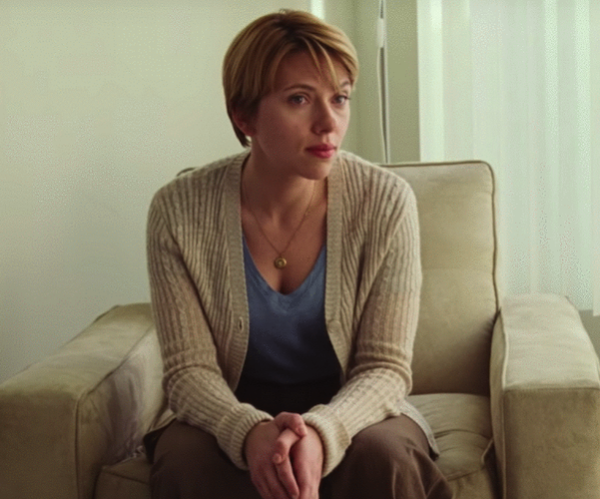Film Review: “Marriage Story” — A Divorce From Hell
By Erica Abeel
What makes Marriage Story unbalanced and faintly dishonest is that we end up rooting for the clueless male egomaniac.
Marriage Story, directed by Noah Baumbach. Screening at Coolidge Corner Theatre and Kendall Square Cinema beginning on November 22.

Scarlett Johansson, Azhy Robertson, and Adam Driver in a scene from “Marriage Story.”
Director Noah Baumbach is noted for spinning threads from his own life into movies. His films might be viewed as the cinematic equivalent of autofiction. Dramas of domestic discord, they’re centered on divorce (The Squid and the Whale), misalliances and sisterly strife (Margot at the Wedding), overbearing parents (The Meyerowitz Stories), and other assorted woes of often well-off unhappy families. To judge by Baumbach’s modus operandi, Marriage Story — which could be subtitled My Divorce — presumably reflects aspects of his own split in 2010 from actress Jennifer Jason Leigh. The film also stands as arguably the most fully realized project in the Baumbach canon. (It was the centerpiece of this year’s NY Film Festival.) The two leads, fleshed out in wicked detail, are individuals we instantly recognize, while the supporting players are either the butt of mordant satire or comic caricatures who supply needed levity to a divorce from hell.
Marriage opens in media res, a device that cunningly teases and disorients the viewer. Accompanied by images of cozy domesticity, Nicole (Scarlett Johansson in a boyish coif) spells out the lovable traits of her husband Charlie (Adam Driver, movie guy of the moment): he’s a neatnik, a great father, unperturbed by the tantrums of their son Henry (Azhy Robertson), endearingly competitive at Monopoly. Then it’s Charlie’s turn: Nicole is a good — maybe too-good — listener, gives great haircuts, can dance up a storm. We’re then yanked into the movie’s “present”: in fact, Charlie and Nicole have decided to call it quits and what we’ve been hearing is a written exercise devised by a couples therapist to preserve the positive and focus on what initially drew them together
Nicole, an actress and native Californian, has snagged a TV pilot and flies out to L.A. with eight-year-old Henry, where they bunk down in her mother’s plush digs (verging on real estate porn). After the TV pilot goes to series, Nicole settles in L.A. for the duration, enrolls Henry in a new school, etc. — a cruel blow for Charlie, a devoted father, who persists in thinking of them as “a New York family.”
Enter the divorce attorneys to promptly steal the movie. Laura Dern, perfection, is Nicole’s fashion-forward lawyer in red stilettos and camisole worn over the dress — in court, yet — her voice a mix of honey and deadly nightshade (why does she sound a bit like Kamala Harris?) As Charlie’s killer lawyer, Ray Liotta, his ice-grey gaze free of human empathy, is pure joy. Whoever cast Liotta deserves a special award; I would have gladly followed him into his own movie. The hostilities build to a sort of pre-finale, a Gotterdammerung staged by Charlie and Nicole that all but shouts “Oscar bait!” Come awards season, much will be made of these amazing actors who lob insults at each other with such venom viewers may feel that they themselves have no right to be there.
The craft of Marriage is impeccable, flashbacks to the couple’s Brooklyn life among the haimish theater troupe intermixed with scenes set in L.A., where Charlie attempts a dismal Halloween with his son and generally can’t set a foot right. In a revelatory moment in the lawyer’s suite, Nicole reverts to old married habits and orders lunch for Charlie when he can’t decide (Dern, of course, orders the kale salad). Clearly, the pair still care for each other — even though it no longer “makes sense” to stay together, as Nicole puts it in a final scene that masterfully circles back to the beginning. Marriage also torches a legal system that manages the trick of turning two decent people, who are determined to remain friends, into mortal enemies. Bankrupting them in the process. Luckily for Charlie — or sadly ironic — mid-divorce he’s awarded a MacArthur “genius grant.” Which he might as well sign over to his lawyer. This begs the question, what happens to the rest of us who don’t have the genius at our disposal to win a MacArthur?

Scarlett Johansson in a scene from “Marriage Story.”
And though, as Henry, Azhy Robertson can only be applauded, it’s painful to see a child caught in a tug-of-war between adults prone to yelling “fuck that.” Worse, for all its insight and polish, there’s something dishonest at the heart of Marriage. Especially when you listen to Nicole. It’s she who has likely instigated the split, the implication being that Charlie was both too obtuse to recognize her needs or even realize duh the marriage was unraveling. Her beef is that she “went along with his life,” as she tells Dern (during a wonderfully acted set piece where she’s shaping “her story” for the court). In the theater she just became “the actress,” while Charlie, the director, was the draw — and (of course) wouldn’t let her direct. “It was his life … I got smaller … I’d never come alive for myself … The pilot was a lifeline thrown to me.”
Along with the psychobabble — someone says “own it” at some point — this is an oft-repeated story. The portrait of a woman suddenly declaring “Okay, it’s my time” may be true for Nicole; is doubtless true for countless other women — but we’ve seen and read this kind of epiphany so often in movies and novels it delivers less of a payload than Baumbach might have hoped.
At the same time, the film sets up Charlie as the “bad guy,” the one who “didn’t get it” — the male artist’s overweening ego kind of thing. He may have won a MacArthur, but according to Nicole, “he couldn’t see me as separate from himself.” Yet it’s Driver’s big bearlike Charlie who comes across as the more sympathetic character. It’s Charlie who is bludgeoned by Nicole’s decision to abscond with Henry to the West Coast — “I’ll never be a parent again,” Charlie says. “I feel like a criminal.” In one semicomic scene, he literally bleeds and collapses on the floor.
What makes the film unbalanced and faintly dishonest is that we root for the clueless egomaniac — and dislike Nicole for making off with their kid so she can act in what looks like a seriously cheesy TV series (which of course Charlie is quick to disparage). You get the sense that, by way of Charlie’s obtuse behavior, Baumbach is working through some private guilt trip — and manipulating the audience into coming down on the husband’s side. This suggests that perhaps there’s a second, even more intriguing story, lurking like a palimpsest behind Marriage Story. Still, viewers should enjoy the phenomenally crafted tale.
Erica Abeel is a novelist, film and cultural critic, and former professor at CUNY. Her journalism has appeared in the New York Times, Indiewire, and other major sites and publications. Wild Girls, her most recent novel, was praised by Oprah Magazine as a “libidinous period novel [that] follows three budding feminists through an elite women’s college, the New York art scene, and Allen Ginsberg’s bed, as they redefine womanhood for themselves and future generations.”

Great review. Excited to see it. On Netflix eventually, I hope
Finished watching this movie an hour ago, and — though we didn’t find its sympathies as unbalanced as you did — you touched all the bases. Another great review.